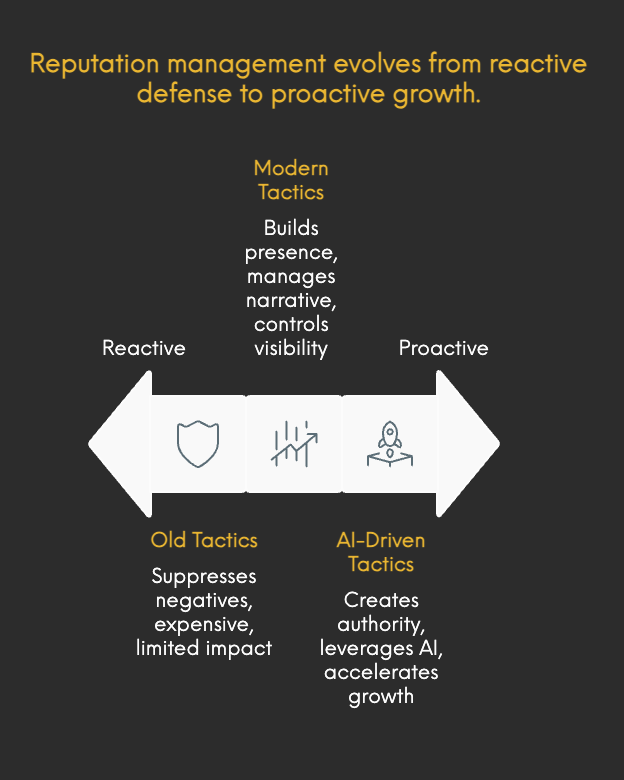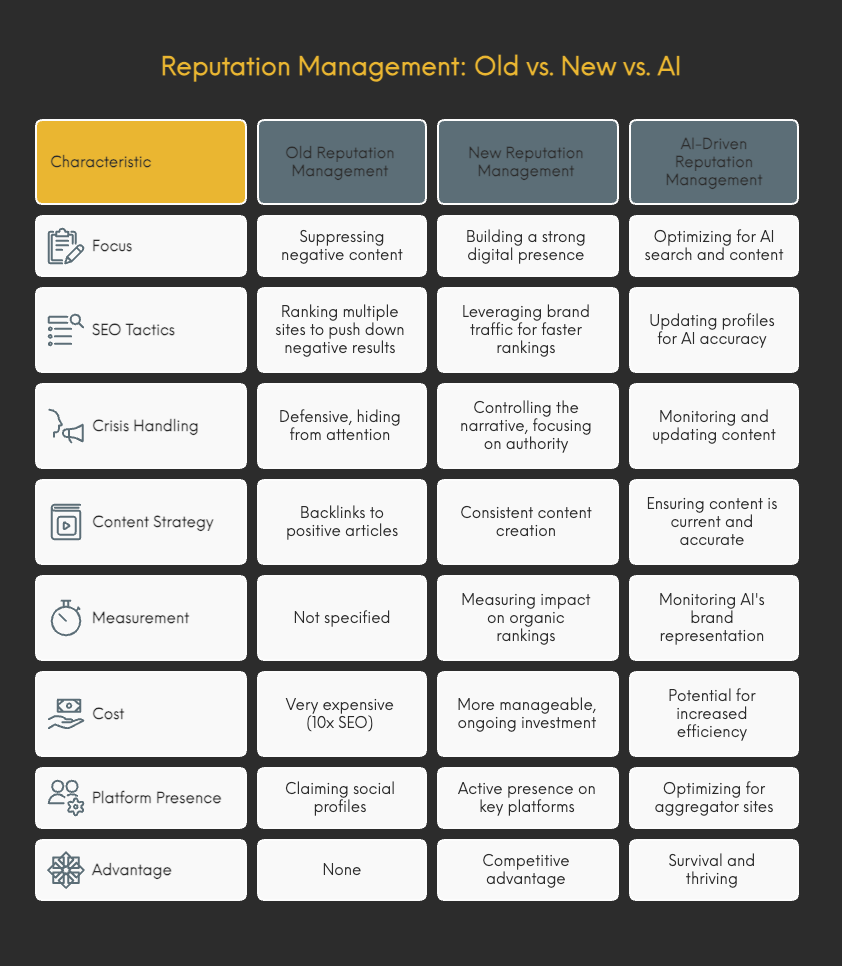I've been watching businesses waste money on brand and reputation management for years now.
They're still handling it like it's the Wild West days of SEO, back when you could publish any random website and somehow outrank legitimate companies.
Those days are long gone, but apparently nobody got the memo.
After 18 years in this game… starting with direct response marketing in 2007 and moving into SEO, I've learned that almost everything businesses think they know about protecting their brands online is wrong.
And it's costing them a fortune.
Watch a whole interview of myself and our SEO team member Alannah discussing this:
The $50,000 Wake-Up Call
I regularly see businesses dropping $50K+ on reputation management.
The humbling fact?
Most of it is wasted money.
Traditional online reputation management is incredibly expensive, and here's why.
Think about regular SEO for a second.
You're trying to rank one website for one keyword, right?
Pretty straightforward.
But reputation management?
That's a whole different beast.
Here's the brutal math: Using traditional reputation management tactics, you're essentially trying to rank 10 different sites on the first page just to push down one negative result.
You're not just ranking one website like you would for traditional SEO. You're trying to rank 10 sites on the first page to suppress the others, to push them down.
That's why it's been seen as expensive, because it literally is 10 times the cost of traditional SEO.
When you put it that way, those eye-watering quotes suddenly make sense.
You're not paying for one SEO campaign, you're paying for ten simultaneous campaigns.
But what if I told you that whole approach is outdated?
How Google Really Changed the Game
My 18 years of experience has taught me something that honestly surprised me about how Google's algorithm evolved, especially after watching what happened in the Australian market.
Back in the day, you could rank literally any site.
Didn't matter what their reputation was.
Small unknown sites were outranking Kmart, Bunnings, all these massive companies.
It was pretty wild, actually.
But those days are done.
Google got smarter.
Through my own testing, I've found that when a site gets a lot of brand traffic, when it gets a lot of brand searches, rankings just happen so much faster. That's really the key, that's where brand comes into SEO.
If people are actively searching for your brand name, Google figures you must be legitimate.
It's like a vote of confidence that unlocks faster rankings.
This discovery completely changes how you should think about reputation management.
The Crisis Paradox That Will Shock You
Here's something that will probably blow your mind: When there's been a crisis, I've only seen sites shoot up. I've never seen a site's rankings drop during a crisis.
Not once.
What impacts your rankings is your reputation, whether that's good or bad.
As smart as Google is, the algorithm doesn't really distinguish between good attention and bad attention… it just recognises authority and relevance.
More mentions, more searches, more traffic.
Google interprets that as increased importance.
Your rankings are probably gonna increase if you suddenly have all this bad press out there.
This doesn't mean you should go looking for controversy.
But it does mean that during a crisis, your focus should be on controlling the narrative rather than trying to hide from the attention.
The visibility boost is coming whether you want it or not.
Now that you understand how Google really works, let me show you why the old approach fails.
Why the Old Defensive Strategy Fails

The old reputation management playbook was basically playing defense 24/7.
I remember those early days when we started SEO, reputation management was more about protecting your reputation from people writing reviews, trying to rank for things like 'brand name scam' or 'brand name horror story.'
The strategy back then was pretty basic:
- Claim your social profiles
- Build some backlinks to positive articles
- Try to outrank the bad stuff
Simple, but limited. And expensive.
Modern reputation management? It's completely different. Instead of trying to suppress negatives (which, let's face it, often doesn't work anyway), it's about building such a strong digital presence that your brand becomes undeniable.
But there's a new player that's changing everything again.
The AI Revolution Nobody's Preparing For
AI is changing how search works, and most businesses have no clue what's coming.
The AI engines are gonna look at your brand too.
They're not gonna look at small sites that don't matter.
They're gonna look at your Trustpilot, your YouTube, all of those, your Google business profiles.
Think about it.
When ChatGPT or other AI tools answer questions about your business, where do they get their information?
They pull from the same authoritative sites that rank well on Google.
Trustpilot, YouTube, Google Business Profile.
The big aggregator sites.
Which means if you're not on these platforms, you basically don't exist in the AI world.
Your Outdated Content Time Bomb
But there's a bigger issue.
The internet is forever.
So AI could be pulling something from 2007 that's completely inaccurate.
AI doesn't know your old content is outdated.
If you had different messaging five years ago, or if there's old information about your business floating around, AI might serve that up as current truth.
This is why I emphasise updating all your profiles and citations regularly.
It's not just about SEO anymore.
It's about what AI tells people about your business.
The Wild West of AI Search (And How to Win)
Right now, AI search results are inconsistent. The results are all over the place at the moment, this is brand new.
It's the new wild, wild West.
I compare it to early Google.
Remember when Google results were terrible?
Now they're pretty reliable.
AI will probably follow the same path.
The smart move is to position yourself now while it's still chaotic.
Get on the authoritative platforms.
Keep your messaging consistent.
Focus on being helpful.
When AI search stabilises, you'll already be in the right places.
My Long-Term Reputation Management AI Strategy (That Actually Works)
Most people are freaking out about AI.
I'm not.
My approach is pretty simple: Human nature and our psychology is never going to change.
I'm focusing on Marketing 101 principles:
- Understanding customer problems and frustrations
- Creating helpful content for their journey
- Answering questions customers actually have
- Being an authority in your space
If you bring helpful content that's going to help people, you're going to have a voice in the market... you're gonna have a voice in the AI space as well.
The fundamentals don't change just because the technology does.
Now, let me show you how this applies differently depending on your business size.
Two Different Playbooks: Enterprise vs Local
My insight about local businesses really stands out here. The traditional approach of trying to rank 10 sites for every negative result?
Most local businesses can't afford that.
But they don't need to.
For local businesses, modern reputation management is basically just good SEO fundamentals done consistently. It's just part of good SEO these days, and that's how we should be looking at it.
This reframes everything.
Instead of reputation management being this expensive crisis response thing, it becomes an ongoing marketing investment.
Much more manageable for small businesses.
Enterprise companies?
They still need the comprehensive approach, but even they benefit more from building a strong presence than suppressing negatives.
My Direct Response Marketing Breakthrough
My background in direct response marketing gives me a different angle than most SEO experts.
I didn't really believe in brand marketing because with direct response, it's all about the offer. You can make a lot of money just with a good offer.
But 18 years of experience taught me something important: There comes a stage in a business where if you want to break to the next level, you do need to have a reputable brand.
I'm bridging two worlds that don't usually talk to each other, the immediate ROI focus of direct response and the long-term value of brand building.
A good offer will definitely get you some wins.
But if you want to really scale, you need a proper brand and proper reputation that backs up your offer, that backs up your product and services.
Most SEO experts don't have this dual perspective.
They've never had to prove immediate ROI the way direct response marketers do.
So what does this all look like in practice?
The Three-Layer Reputation System That Actually Works

Through testing across multiple sites, I've figured out what Google's algorithm actually rewards these days.
It's not just about individual tactics, it's about the complete digital presence.
Think… Search Everywhere Optimisation!
Layer 1: Platform Presence Your Google Business Profile needs to be solid with good ratings.
You need a YouTube channel that you actually use.
Facebook, Instagram, Twitter - active presence, not just ghost accounts.
Plus profiles on whatever industry platforms matter for your business.
Layer 2: Authority Signals News mentions, media coverage, brand mentions across authoritative sites (not just backlinks), content that shows you know what you're talking about.
Layer 3: Search Behavior Consistent brand search volume, direct traffic to your website, engagement across multiple touchpoints.
That's the comprehensive picture that Google looks at these days, based on our testing.
Obviously, I didn't write the algorithm, but we work on a lot of sites, and that's what we're seeing across the board.
I'm honest about not having insider knowledge, just real-world testing results from 18 years in the field.
Your Step-by-Step Brand & Reputation Building Action Plan
I'm not talking about becoming the next Coca-Cola here.
My philosophy is straightforward: build the fundamentals properly.
Start with these immediately:
- Check your brand search volume—how many people actually search for your brand each month?
- Claim and optimise all relevant profiles (don't just create them and forget them)
- Set up systematic content creation—regular stuff that shows your expertise
- Monitor where your brand gets mentioned online
- Start building relationships with media contacts
Long-term thinking:
- Create content that makes people want to search for your brand
- Build systems for keeping your profiles updated
- Look for opportunities to create newsworthy moments
- Actually measure how reputation impacts your organic rankings
The New Rules of the Game
My insights show that reputation management has evolved from crisis control to growth acceleration.
The businesses that get this will dominate their markets.
The ones still thinking defensively?
They'll keep throwing money at outdated tactics.
The new rules:
- Prevention beats suppression every time
- Brand searches actually drive organic rankings
- Your complete online presence matters more than individual tactics
- Crisis can boost visibility if you handle it right
- Reputation management is ongoing SEO, not emergency response
Don't Get Left Behind
Traditional reputation management is expensive because it's fighting the wrong battle.
Modern reputation management isn't about suppressing negatives, it's about doing the basics that have always worked for SEO right and building such a strong positive presence that negatives become background noise. If you need help with your SEO you can see how our SEO services can help you with taking advantage of building your brand in this new AI world we operate in.
The businesses that embrace this approach will find reputation management becomes their competitive advantage, not their biggest expense.
You can keep fighting yesterday's battles with yesterday's tactics, or start building tomorrow's brand with today's opportunities.
The algorithm has already picked its side.
And with AI coming fast, the businesses that understand this shift will be the ones that survive and thrive.
Get the basics right and start building your brand online. Focus on what matters, and your results will grow.

